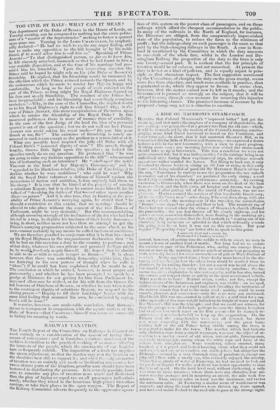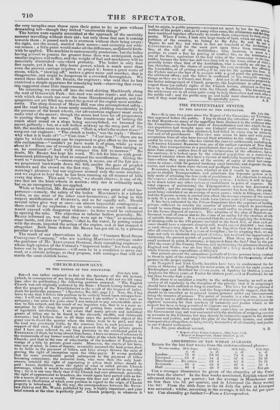A RIDE ON MACEHON1'S STEAM-COACII.
lEAntNe that Colonel 111Am:exit's " improved boiler" had got the steam up, and that under the auspices of a company of shareholders, the new cerriae:! was going ahead at a greater rate than the old one—which, it 'I I:1 be remembered by the readers of the Colonel's amusing autobio- graphy, some kind friend borrowed to travel on the Continent, and n,sser returmied,—in short, that it had mastered Shooter's 11111, as its forerunner did the hills of Harrow and Stanniore,—we expressed a desire to have a ride in the new locomotive, with a view to report progress. Nothing more easy ; any morning beggar( four o'clock the steam-coach should take as up at Greenwich, This was a condition we were not quite prepared for; but it was indispensable ; far the carriage being in an. unfinished state during these experimental trips, its strange uncouth apeLarmice rather startled the horses. Not liking to back out, it only remeined to choose between sitting up till four or rising at that early hour ; and, beilig mindful of good old Sir MATTIIEW Mix s ' advice to his son, " Sometimes be curious to see the preparation the sun maketh in coming out Of his chamber," we preferred the early rising; a cool head boing ,:(sirable to time the performance accurately. An evening excursion to Greenwich, when there was room on the deck of the boat to in5va ;.1).,lit, and the little town, all hospital and tavern, was begin- imm; to co,d after getting rid of' the crowd of Cock hies, was not un- I laving secured the services of that invaluable functionary,-a . all ti, wmmr:,,l's "own man"—who sleeps, if he ever does sleep, with one eye on the clock—the morning-star of' the traveller, the constellation " Bootes "—we sipped one glass and then to bed. The monitory rap of Boots hail not ceased. when the chimes of Greenwich church affirmed his punctuality : the sun had thrown off his cloudy nightcap, and his golden tresses, somewhat dishevelled, were floating in the morning air; hut, (merles, the preparation that the God maketh in "conning out of his chamber," by no means so splendid as that which ordinarily attends his going ism it—ut least it was not on this occasion. But your regular " !'cep-oiday-boys" are better able to speak to this point.
" A $eitiIily wind :Ind a cloudy sky a hunting morning:"
instead, however, of getting into the saddle to ride to cover, we were to mount a horse of another kind of mettle. Not long had we to endure the scrotinous gaze of the Policeman, who, seeing one emerge frown a tavern at four in the morning, and no conch or steam-boat preparing to start. naturally looked fire somne unsteadiness of' gait or Watertdirdism of CO:Id At the appointed time, a tinge dusky mass loomed in the dis- tance; :eel we theeelit ho Aka 1,01VO would be startled from its atonbers by its mauling thunder: lint not a sonnd was heard above the low rinnide of wheels, lass noisy than an ordinary omnibus: the im- mense elephantine in size and sagacity, and in hue also, turned the corner, and skipped short as quietly as the most. accustomed vehicle. 'What was themmo to tear? Neither steam, smoke, nor fire, except the lighted eim_:moms of the helmsman and engineer, was visible : on we sped, gliding- co, cm the groand at a rapid rate, and threading the intricacies of the narrow streets that had to the main road: nothing could be more smou01, pleasant, and convenient—old v the seats were not cushioned. 3ft:1J:heath Dill was surmounted in gmillmmt style ; a stiff trial for a Dia- 1 chine upwards of live tons weight including its freight of water and fuel. Pee S1seeer's !lilt was the triumph ; and that we could not witness, for then the pinaps Were all locked: perlimips because the thirsty leviathan !aid s■m-,d;.,wc.1 much water on its first ascent—for its stomach re- - ,immires smonhm dm)zen haekets-full to keep up the evaporation. On the Eithem road the pump-handles were not all fettered, but there iv.C■ Came e:apteting with the water- carts ; and the great barn- ; dmokin.2• hall of the old Palace being visible among the trees, it ' was a),reeml to make for the town. '1'111! wonder, which had hitherto only cliaited a stare from a stupid waggoner, was now the object of at- Imma,Mmimm to a modey crowd of old wives, servant-girls, farming-men, am ,d tradespeople, among whom time white caps and Ewes of the in.k(rn were colISIdenOtIS. Some w,00lered, others sneered, many. Imisted, a f_an pryed and llsdied knowing about what they could not nederstaed, and one or two ostlers cat stable-jokes; but altogether the I;Th lemMes seemed in a very thorough slate of puzzlement, except one jelly old fellow with a merry eye, who evidently enjoyed the novelty. ,:ere inmmg plenty of water at tootseray, we had no need to look out for ley ds or inquire for wells; and there was better opportunity to time the 0.:te of speed. Oe the hard level road, without slackening, a mile wns done in three minutes : where there were any obstacles, four mi- nutes was the average; and in mounting an ascent, the mile took five whittles. Thus, twenty nines an hour was the maximum, and twelve the minimum ratio. At Footscray a similar scene of wonderment was enacted ; and along the road windows were thrown up, doors opened, and flies and maids flocked to the road-side to gaze at the strange sight: the very turnpike-men threw open their gates to let us pass without demanding toll—though they looked "unutterable things." The horses were equally astonished at the approach of the unwieldy monster travelling without their aid ; but only those that met it coming towards them : it passed such as it overtook without their being aware; the sight, not the sound, startled their senses—and certainly not with- out reason : a little paint would make all the difference, and:should forth- with be applied. The machine is unnecessarily ponderous ; but the boiler having proved to possess far greater force than was anticipated, much smaller engines will suffice, and the weight of fuel and machinery will be materially diminished—one-third probably. The boiler is only four feet square, yet it has a fifty-horse power, which is much more than even the present carriage requires to propel it : hence a great waste of steam, which, " blowing off," makes a great noise and smother, that is disagreeable, and might be dangerous in a crowded thoroughfare. We stated these defects to Mr. BEALE, the engineer ; who said that he had contrived a simple apparatus for remedying both—observing that every trip suggested some little improvement. On returning, we struck off into the road skirting Blackheath, along the wall of Greenwich Park : this road was under repair ; and the ease with which the coach ran over the loose Macadamized granite, and the quagmires not yet filled up, tested the power of the engine most satisfac- torily. The steep descent of Maize Hill was also accomplished safely ; and the road being in a loose sandy condition, yielding considerably to the pressure of the broad wheels, our adventurous engineer must needs make trial of the ascent ; though the steam had been let off preparatory to passing through the town. The troublesome task of turning the coach short round on a slope being accomplished, we breasted the ascent gallantly ; but, at a soft hollow midway up the steep part of the hill, the machine came to stand-still. "Halle°, what's the matter there?" sung out our engineer : "The clutch is broke," was the reply : "Broke! why what is it made of?"—" Cast-iron." " cast-iron !"—there are no signs by which contempt can be expressed to give effect to the tone of this exclamation—" couldn't ye have made it of glass, while ye were about it P Have one of wrought-iron made to-day." Then turning to us, he continued—" And we'll conquer this bill to-morrow." No doubt, Mr. BEALE has kept his word. We felt for him as with good- humoured philosophy he tried to conceal his mortification. Giving the word to "reverse her "—steam-engines, it seems, are of the fair sex— we progressed backwards down the hill, amidst the gaze of peopled windows and the crowd on the foot-way. This accident damped the
morning's pleasure ; but our engineer seemed only the more resolute ; and we expect to hear that he has been running up all manner of hills every day since. This said " clutch," we should observe, is one of the two that set the hind-wheels in motion ; only one is ordinarily used, but on an emergency both are applied.
While at breakfast, Mr. BEALE satisfied us on one point of vital im- portance—namely, the safety of the boiler. MAcEnolds is a tubular
boiler, as are most of the other road-locomotives ; all being in this
respect modifications of GURNEY'S, and so far equally safe. Should several tubes give way at once—an almost impossible contingency—
there could be no explosion ; for no tube contains so much steam as would expand with dangerous violence : its force would be exhausted in opening the tube. The objection to tubular boilers generally, Mr.
BEALE informed us, was that they were apt to "fur," or accumulate crust inside, and also to " prime,"—that is, the water, by getting mixed with the steam, impeded the action of the engine, and at last stopped it altogether. Both these defects Mr. BEALE has got rid of; by a process peculiar to himself.
The result of our observations is, that the "Common Road Steam Conveyance Company," who are working MAennosi's carriage under the guidance of Mr. ALEXANDER GORDON, their consulting engineer— whose high opinion of the Colonel's " improved boiler" has been amply
borne out by its performance—will soon be in a condition to serve any road, at a certain mileage, as they propose, with carriages that will not startle the most skittish horse.



























 Previous page
Previous page